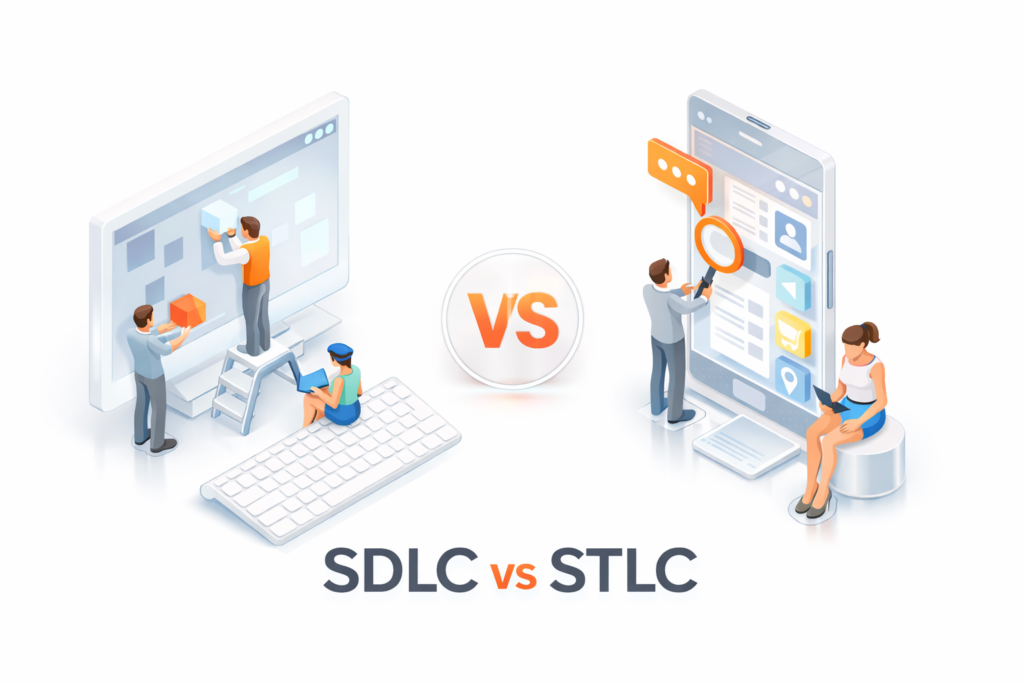Software testing is a crucial part in creating a successful project. By assessing every facet of the product, a developer will know if the code meets business requirements. It’s through the testing that companies increase user tolerance and improve the performance of their apps.
Having said that, testing is only as beneficial as it is efficient. There are two main approaches to testing – manual or automated. Both are critiqued and advocated all over the web, so choosing the one to fit your project is not an easy task. In this post, we’ll give you a brief rundown on the difference between them, their respective pros and cons, and the ways developers can take advantage of both.
We have been providing automated and manual performance testing services since 2008, and have done it for 300+ customers, so our 400 employees will be happy to share their experience.
Automated Mobile App Testing
Automated testing is an approach that implies using a tool to find defects and assess the performance of the product. In order to get started, a QA specialist chooses a set of tools, writes scripts, executes them, and collects the data. These tests can run without human supervision, but a developer will be limited by the choice of tools. That’s why executing automated tests on complex scenarios is rarely a way to go.
Automated app testing is used in order to test features that require a high load of tests to be executed simultaneously, as well as those that require a large amount of data.
While automation often seems like an easy solution for testing multiple processes (especially for regression testing) due to being fast, efficient, and unsupervised, it has its drawbacks as well.
Pros
Cons
Who needs it?
We suggest you use automated testing in the following situations:
Examples
Automated testing can be used on all stages of the mobile app development cycle. However, there are certain cases that are particularly fitting for it.
Manual Mobile Application Testing
Manual testing is the most basic type of testing, and it relies on human supervision only. This approach presumes that a QA specialist will execute the test on his own from beginning to end without using automated tools, extensions, or scripts.
While manual testing can be tedious and time-consuming, you can’t avoid it completely. Any application needs to be tested manually before tests can be automated. The good news is, while for automated tests companies often have to hire an automation engineer, the manual ones don’t require looking for a new talent outside of the team of testers.
Over the last few years, manual app testing has started losing its ground to the automated approach – the latter proving to be faster and more efficient. Having said that, it might be too early to claim manual testing dead as it has its own advantages.
Pros
Cons
Who needs it?
It’s often challenging for project managers to break a tie between manual and automated testing. There are too many factors to consider – the scale and the scope of the project, the delivery date, the size and the skill level of the team, and so on.
In order to make the decision-making process easier, here’s the list of cases when QA specialists tend to choose manual testing.
Examples
With the rapid advancement of technology, it seems there are hardly any functions that cannot be automated. In reality, in some areas automation still does a poor job. Here are some examples of cases that are normally tested manually:
App Testing Services at PFLB
A team of competent testers is crucial for app testing. At PFLB, our certified QA specialists are experienced in both manual and automated mobile testing.
You can consult PFLB regarding a particular stage of testing or the entire cycle. We work closely with developers, and you will get regular reports from our testers. You’ll have your personal account manager to help you through the entire development process and ensure your satisfaction along the way.
Take a look at our list of performance and load testing services to see how PFLB can help you. Our expertise includes jmeter mobile app testing, ensuring your application remains fast, reliable, and scalable under real-world conditions. If you want to contact us to discuss quality assurance for your project, be sure to leave a message!



